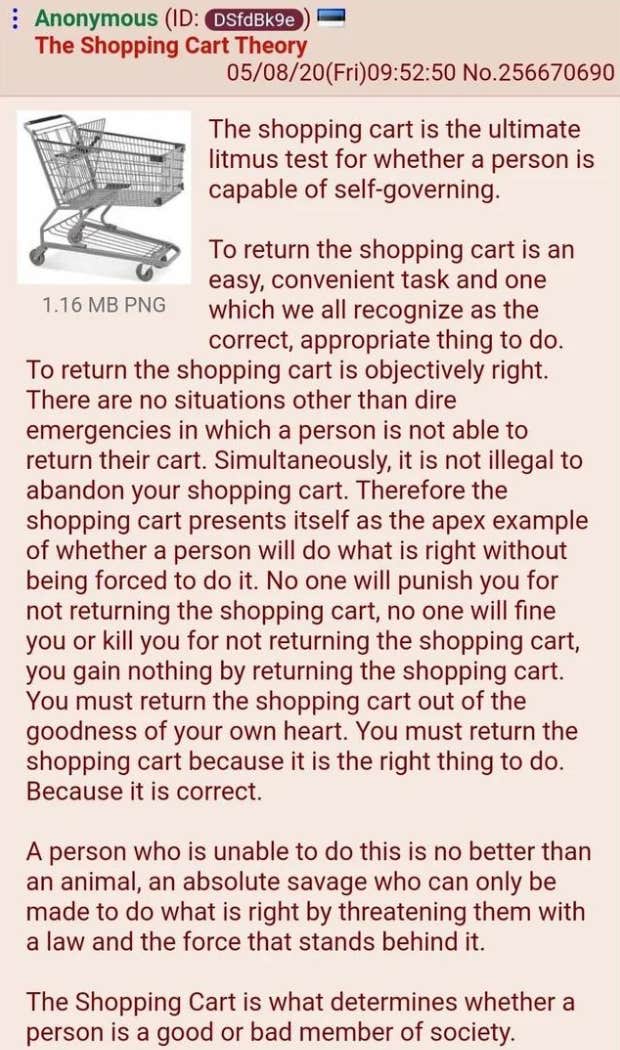The ‘Shopping Cart Theory’ Actually Does Reveal Something About People's Character, According To Study
While the morality aspect is complicated, our shopping carts really do say something about who we are.
 PeopleImages.com - Yuri A, Alexander Oganezov / Shutterstock.com; Canva Pro
PeopleImages.com - Yuri A, Alexander Oganezov / Shutterstock.com; Canva ProWe've all been there: you go to the grocery store, the shopping carts are all scattered hither and yon, blocking parking spaces and making some poor employee have to wrangle them all in the summer heat. It's total anarchy! Why can't people just put them away like they're supposed to?!
In recent years this dilemma has turned into something of a philosophical debate online, with many believing people's shopping cart reveals some core truths about their character. But a scientist recently weighed in, and it turns out the meaning of our shopping cart habits is fascinatingly complex.
'Shopping Cart Theory' proposes that you can tell who is and isn't a good person by whether they put their shopping cart away.
The "Shopping Cart Theory" has been around for a few years now, and resurfaces seemingly every few months as the debate is re-sparked. Along the way, it's been the subject of countless viral threads, social media videos, and even a comedy segment by the UK's BBC — where it is of course called "Shopping Trolley Theory."
Shopping Cart Theory posits that people's shopping cart habits are 'the ultimate litmus test for whether a person is capable of self-governing.'
The continued virality of the Shopping Cart Theory just goes to show how much it resonates with people — it's one of those weirdly tidy and simple ways to separate the good guys from the shady ones. Or as the theory itself puts it, "the shopping cart is what determines whether a person is a good or bad member of society."
 Photo: Reddit
Photo: Reddit
"To return the shopping cart is an easy, convenient task," a frequently shared 2020 Reddit post says, "and one which we all recognize as the correct, appropriate thing to do." The post goes on to claim that putting back a shopping cart is "objectively right."
But just as important, the post says that not returning a shopping cart is "not illegal" — and this is the crux of the thing. "Therefore," the post says, "the shopping cart presents itself as the apex example of whether a person will do what is right without being forced to do it. No one will punish you...no one will fine you, or kill you... you gain nothing by returning the shopping cart. You must return the shopping cart out of the goodness of your own heart."
Wow man, that's deep! The post goes on to jokingly call those who don't return carts as "animals" and "savages" who can only be compelled to do what's right by force — a hilarious bit of hyperbole that is nonetheless kind of hard to argue against! It just *feels* right, doesn't it? To that end, tag yourself: I'm Chaotic Good.
 Photo: @orctits / Twitter
Photo: @orctits / Twitter
Researchers say the shopping cart theory actually does reveal that humans' tendency toward chaos is contagious.
A 2008 study in the journal Science delved right into the shopping cart issue, long before it was a viral debate with a Googlable catchphrase.
The study focused on the anthropological concept of injunctive and descriptive norms and how they impact our behavior — the former motivates us to act based on how we think people will perceive us, whereas the latter involves "reading the room" and mimicking what others seem to be doing.
The study placed flyers on cars in a supermarket parking lot to see if people would throw them on the ground or throw them in the garbage. And sure enough, there was a direct correlation between the shopping carts in the lot and whether or not people did the right thing.
If the shopping carts in the lot were strewn around higgledy-piggledy, the study subjects were nearly twice as likely to continue the chaos by throwing the garbage on the ground — 58% of them did so as opposed to just 30% who did so when the carts were neatly arranged in their little corral.
So can shopping cart habits accurately measure whether you're a good or bad person?
Not exactly. But they *are* a good measure of how susceptible you are to groupthink. So there you have it — you may not be a bad person if you don't return your shopping cart, but you *are* a lemming. Take that, shopping cart hooligans!
John Sundholm is a news and entertainment writer who covers pop culture, social justice and human interest topics.
